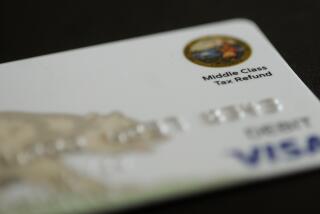Column: This couple put $1,000 on gift cards. But then the money disappeared
- Share via
Gloria and Lewis Polin spent $1,000 at CVS for a pair of Nordstrom gift cards and gave them to their daughter.
She then tried to buy something and — waitaminnit — the cards were worthless.
Both CVS and Nordstrom looked into the matter. Neither company was willing to accept responsibility for the Laguna Woods couple’s missing cash.
“Somebody has a thousand dollars, but there’s no trace of it,” Gloria, 68, told me.
The Polins’ financial misadventure highlights the perils of prepaid cards. Loading money onto plastic should be a straightforward transaction, but it can turn into an exercise in corporate finger pointing — and fraud.
I’ll have some timely holiday-season tips below.
“We thought this would be a nice, simple way to give our daughter something,” Gloria said. “It’s been anything but simple.”
We thought this would be a nice, simple way to give our daughter something. It’s been anything but simple.
— Gloria Polin
Beginning last week, the Polins spent hours on the phone and got the runaround from both CVS and Nordstrom.
“CVS said the cards were activated so it isn’t their problem,” Gloria said. “Nordstrom said they have no record of the cards in their system so it’s not their problem.”
More than $650 billion is expected to be spent on gift cards and other prepaid cards this year, according to the consulting firm Mercator Advisory Group. That’s about 57% more than six years ago.
Such rapid growth highlights the convenience and popularity of gift cards. It also explains why they’re such a tempting target for scammers.
The Polins shared with me their CVS receipt from the Nordstrom card transaction. It showed that each of the $500 cards was activated in the store.
“We spent a thousand dollars, and they were just worthless pieces of plastic,” said Lewis, 70.
The couple collected the cards from their daughter and took them back to CVS. A store manager was unable to figure out the problem and advised the Polins to contact the company’s executive office.
Guess what? The executive office said that even though CVS sold and ostensibly activated the cards, it had no responsibility to find the missing money.
“I have high blood pressure,” Lewis said. “This is not something I need.”
Gift-card scams are more common than most people might think.
A common racket is for a scammer to write down gift-card numbers or scan the magnetic strips while they’re still in the store. He or she then repeatedly checks online to see if the card has been activated.
Once a card goes live, the thief quickly uses the number to make online purchases and have the goodies delivered somewhere safe.
A more sophisticated scam surfaced recently. It involves a fraudster contacting people selling unwanted gift cards. While on the phone with the seller, the thief asks the seller to conference in the retailer, enter the card number and confirm its validity.
What the scammer actually is up to is recording the touch tones when the card number is given, then using the tones to figure out the number and use it to make fraudulent purchases.
Although Nordstrom’s initial reaction when the Polins got in touch was to give them the cold shoulder, things changed quickly after I got involved.
Emily Sterken, a company spokeswoman, emailed me Sunday night to say that “we believe they were victims of fraud and are working to get them fully reimbursed. We are also continuing to partner with our third-party distributor to investigate what happened.”
She declined to elaborate on the nature of the fraud or to name the firm that handled the card activation.
But it looks like Nordstrom leaned on CVS. Gloria said a CVS representative called her Monday to say that the $1,000 would be fully reimbursed.
No one at the drugstore chain responded to my request for more information.
Gloria said she and her husband are glad to have the whole mess resolved. But they’re still frustrated by the companies’ initial response to their plight.
“It’s disappointing,” Gloria said. “You shouldn’t have to contact a newspaper to get a company to help you.”
I agree. Helping customers should be a routine policy, not a public-relations move.
If you want to avoid hassles, keep these pointers in mind before buying gift cards for the holidays:
Only buy gift cards in protective packaging, with the numbers concealed. And even then, look closely to make sure a scammer hasn’t peeled open the package and then put the card back.
Be vigilant. While most store employees are trustworthy, some have been known to use hand-held scanners to swipe magnetic strip info or even keep the activated card and hand you a blank one. You can always ask a cashier to confirm a card’s value after activation, just to be safe.
Think twice before buying gift cards through online auctions. That seemingly discounted plastic could actually be worthless.
It also never hurts to use a gift card as quickly as possible. Once it’s been activated, it’s the same as money. You don’t want it just sitting in a drawer.
David Lazarus’ column runs Tuesdays and Fridays. He also can be seen daily on KTLA-TV Channel 5 and followed on Twitter @Davidlaz. Send your tips or feedback to [email protected].
MORE FROM LAZARUS
Who oversees data brokers selling your personal info? No one
AT&T-Time Warner merger could be blessing in disguise for consumers
Your tax dollars at work: $5 bribes to take a government survey
More to Read
Inside the business of entertainment
The Wide Shot brings you news, analysis and insights on everything from streaming wars to production — and what it all means for the future.
You may occasionally receive promotional content from the Los Angeles Times.











